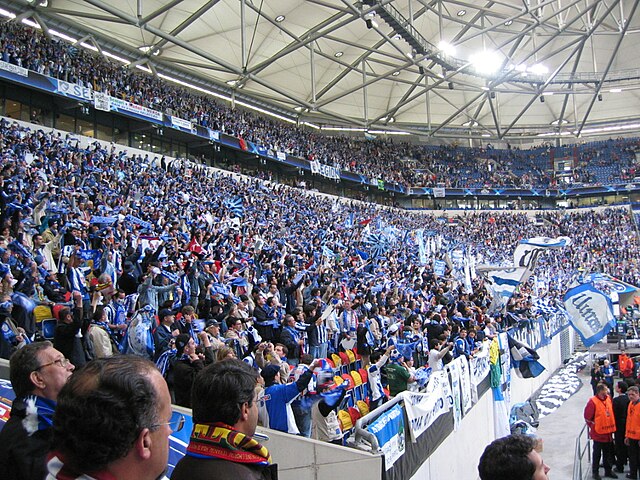When you think about German football, several images doubtless spring to mind – Bayern players drenched in Paulaner after winning another Meisterschale, the ‘Yellow Wall’ in Dortmund, or perhaps the greats who have donned Die Mannschaft’s famous white jersey.
You probably don’t think about lampposts.
Across the nation, concrete-grey urban landscapes are broken up by flashes of colour. There are splotches wrapped around lamp posts, gleaming on street signs, even fixed in the endless loop of the U-Bahn escalators. Everywhere you look, you’re greeted by stickers emblazoned with football badges.
Throughout the nation’s fractured past, football has been a constant, something that all demographics have been able to rely on. The proliferation of stickers in German cities and towns represents how football is woven into the fabric of communities and the country itself.
But the best example of this connection between city and club exists in Gelsenkirchen.
Situated squarely in the Ruhrgebiet, Gelsenkirchen is known as the Stadt der tausend Feuer – ‘the city of a thousand fires’. The nickname refers to mineshafts and blast furnaces, symbols of the coal industry which fuelled its economic and population growth.
Now, Gelsenkirchen looks derelict, ravaged by a rapid deindustrialisation process. Since the Wirtschaftswunder in the 1960s, the average yearly income has slid to less than €18,000–the lowest in Germany–, while unemployment has skyrocketed to over 14%. The city has been unable to maintain or modernise its infrastructure as many fans discovered at last year’s European Championship, having to wait up to three hours for post-match trams.
In 2008, the last of the famous collieries ceased operations, now casting a long shadow over a crumbling city.
However, Gelsenkirchen’s most famous association is still reflected in the cityscape. The streaks of royal blue that adorn virtually every façade are the calling cards of one of the most passionate fanbases in football. But much like the city it calls home, FC Schalke 04 are in freefall.
Once a stalwart of the top division and a regular in continental competition, Schalke have recently lingered in the lower reaches of the 2. Bundesliga. Last season, the Knappen even flirted with relegation to the 3. Liga, before clawing their way to a mid-table finish.
Off the pitch, their financial troubles are well-documented, worsening to the point where extinction became a very real possibility during the 2023/24 season.
But the support of their fans never wavered. In fact, it only improved. Their average home attendance in 2023/24 was 61,438, outnumbering the typical turnout for European giants like Liverpool, Atletico Madrid, and Arsenal.
Through all their troubles, the club has remained the beating heart of Gelsenkirchen. In the midst of the COVID-19 pandemic, mayor Karin Welge called Schalke the ‘social putty’ that holds the city together.
However, a more sinister force has threatened to usurp the passion for the Royal Blues as the overriding sentiment in Gelsenkirchen and destabilise the foundations that Germany itself rests on.
The 23rd February 2025 saw a snap election following the dissolution of the ‘traffic light’ coalition. Two flecks of light blue on the map of constituencies caught people’s attention, the first-ever regions in the West to vote for the far-right Alternative für Deutschland party.
One of these light-blue specks was situated in the middle of the Ruhrgebiet.
The question of whether football can enact socio-political change is often thrown around given the numerous controversies that the sport has become entangled in recently. But how about the other way round? Is it possible that radical shifts in the modern-day political landscape affect how we experience the beautiful game?
This much was evident in the reaction to Elon Musk’s takeover of X (formerly Twitter) and subsequent involvement with prominent xenophobic figures and movements, including the AfD. FC St. Pauli were the first German club to leave the platform in November last year, decrying its transformation into a ‘hate machine’.
The Hamburg-based club were quickly followed by the likes of SV Werder Bremen and Hertha Berlin, though their resistance has not slowed the march of increasingly extreme political attitudes.
What’s more, their departure from X marks the end of fan communities that have grown with the club’s account and use the site as a means of keeping up with their favourite German team.
Germany’s political limbo reflects a global problem, where the upheaval is so great that every facet of society is influenced by it. Worryingly, when people think of Gelsenkirchen now, the proud Royal Blue of Schalke may not be the first thing to come to mind, but rather a different, more ominous shade of cyan.
In times of such political turmoil in Germany, the role of constants like football has shifted. With ever-widening divides and increasing animosity, you get the impression that it’ll take more than just stickers to hold the country together.


